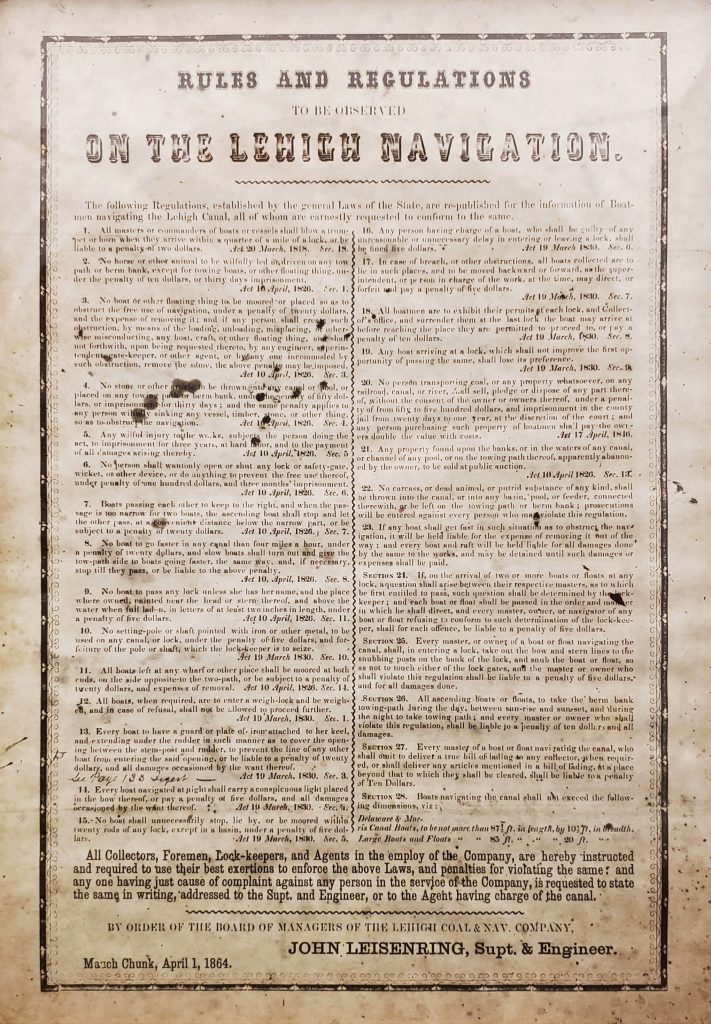
At first glance, carrying cargo up and down the Lehigh Canal seems to be a fairly straightforward operation – but canal-boat captains were actually highly skilled operators who were trained to avoid trouble on the waterways. To keep everything running smoothly, the canal had a strict set of rules and regulations, seen above in a broadside from 1864. Click to enlarge the image, or browse the transcription below!
Rules and Regulations to be Observed on the Lehigh Navigation
The Following Regulations, established by the general Laws of the State, are re-published for the information of Boatmen navigating the Lehigh Canal, all of whom are earnestly requested to conform to the same.
- All masters or commanders of boats or vessels shall blow a trumpet or horn when they arrive within a quarter of a mile of a lock, or be liable to a penalty of two dollars. Act 20, March 1818
- No horse or other animal to be willfully led or driven on any tow path or berm bank, except for towing boats, or other floating thing, under the penalty of ten dollars or thirty days imprisonment. Act 10, April 1826.
- No boat or other floating thing to be moored or placed so as to obstruct the free use of navigation, under a penalty of twenty dollars and the expense of removing it; and if any person shall create such obstruction, by means of the loading, unloading, misplacing, or otherwise misconducting, any boat, craft, or other floating thing and shall not forthwith upon being requested thereto, by any engineer, superintendent, gate-keeper, or the agent, or by any one incommoded by such obstruction, remove the same, the above penalty may be imposed. Act 10, April, 1826.
- No stone or other article to be thrown into any canal or pool, or placed on any towing path or berm bank, under the penalty of fifty dollars, or imprisonment for thirty days and the same penalty applies to any person willfully sinking any vessel, timber, stone, or other thing so as to obstruct the navigation. Act 10, April, 1826.
- Any willful injury to the works, subjects, the person doing the act, to imprisonment for three years, at hard labor, and o the payment of all damages arising thereby. Act 10, April 1826.
- No person shall wantonly open or shut any lock or safety-gate, wicket, or other device, or do anything to prevent the free use thereof, under penalty of one hundred dollars and three months’ imprisonment. Act 10, April, 1826.
- Boats passing each other to keep to the right, and when the passage is too narrow for two boats, the ascending boat shall stop, and let the other pass, at a convenient distance below the narrow part, or be subject to a penalty of twenty dollars. Act 10, April, 1826..
- No boat to go faster in any canal than four miles a hour, under a penalty of twenty dollars, and slow boats shall turn out and give the tow-path side to bats going faster, the same way, and, if necessary, stop till they pass, or be liable to the above penalty. Act 10, April, 1826.
- No boat to pass any lock unless she has her name, and the place where owned, painted near the head or stern thereof, and above the water when full laden, in letters of at least two inches in length, under a penalty of five dollars.
- No setting-pole or shaft pointed with iron or other metal, to be used on any canal, or lock, under the penalty of five dollars and forfeiture of the pole or shaft, which the lock-keeper is to seize. Act 19, March 1830.
- All boats left at any wharf or other place shall be moored at both ends, on the side opposite to the two-path(sic), or be subject to a penalty of twenty dollars, and expense of removal. Act 10, April, 1826.
- All boats, when required, are to enter a weigh-lock and be weighed, and in case of refusal, shall not be allowed to proceed further. Act 19, March, 1930.
- Every boat to have a guard or plate of iron attached to her keel, and extending under the rudder in such manner as to cover the opening between the stem-post and rudder, to prevent the line of any other boat from entering the said opening, or be liable to a penalty of twenty dollars, and all damages occasioned by the want thereof. Act 19, March, 1830.
- Every boat navigated at night shall carry a conspicuous light placed in the bow thereof, or pay a penalty of five dollars, and all damages occasioned by the want thereof. Act 19, March, 1830
- No boat shall unnecessarily stop, lie by, or be moored within twenty rods of any lock, except in a basin, under a penalty of five dollars. Act 19, March 1830
- Any person having charge of a boat, who shall be guilty of any unreasonable or unnecessary delay in entering or leaving a lock, shall be fined five dollars. Act 19, March, 1830.
- In case of breach, or other obstructions, all boats collected are to lie in such places, and be moved backward or forward, as the superintendent, or person in charge of the work, at the time, may direct, or forfeit and pay a penalty of five dollars. Act 19, March, 1830.
- All boatmen are to exhibit their permits at each lock, and Collector’s office, and surrender them at the last lock the boat may arrive at before reaching the place they are permitted to proceed to, or pay a penalty of ten dollars. Act 19, March, 1830.
- Any boat arriving at a lock, which shall not improve the first opportunity of passing the same, shall lose its preference. Act 19, March, 1830.
- No person transporting coal, or any property whatsoever, on any railroad, canal, or river, shall sell, pledge, or dispose of any part thereof, without the consent of the owner or owners thereof, under a penalty of from fifty to five hundred dollars, and imprisonment in the county jail from twenty days to one year, at the discretion of the court; and any person purchasing such property of boatmen shall pay the owners double the value with costs. Act 17, April, 1815
- Any property found upon the banks, or in the waters of any canal, or channel of any pool, or on the towing path thereof, apparently abandoned by the owner, to be sold at public auction. Act 10, April 1826.
- No carcass, or dead animal, or putrid substance of any kind, shall be thrown into the canal, or into any basin, pool, or feeder, connected therewith, or be left on the towing path or berm bank; prosecutions will be entered against every person who may violate this regulation.
- If any boat shall get fast in such situation as to obstruct the navigation, it will be held liable for the expense of removing it out of the wail and every boat and raft will be held liable for all damages done by the same to the works, and may be detained until such damages or expenses shall be paid.
- If, on the arrival of two or more boats or floats at any lock, a question shall arise between their respective masters, as to which be first entitled to pass, such question shall be determined by the lock-keeper; and each boat or float shall be passed in the order and manner in which he shall direct, and every master, owner, or navigator of any boat or float refusing to conform to such determination of the lock-keeper, shall for each offence, be liable to a penalty of five dollars.
- Every master, or owner of a boat or float navigating the canal, shall, in entering a lock, take out the bow and stern lines to the snubbing posts on the bank of the lock, and snub the boat or float, so as not to touch either of the lock gates, and the master or owner who shall violate this regulation shall be liable to a penalty of five dollars, and for all damages done.
- All ascending boats or floats, to take the berm bank towing-path during the day, between sun-rise and sun-set, and during the night to take towing path; and every master or owner who shall violate this regulation, shall be liable to a penalty of ten dollars and all damages.
- Every master of a boat or float navigating the canal, who shall omit to deliver a true bill of lading so any collector, when required, or shall deliver any articles mentioned in a bill of lading, at a place beyond that to which they shall be cleared, shall be liable to a penalty of Ten Dollars.
- Boats navigating the canal shall not exceed the following dimensions, viz: Delaware & Morris Canal Boats, to be not more than 87 ½ feet in length, by 10 ½ feet, in breadth. Large Boats and Floats to be not more than 85 feet in length by 20 feet in breadth.
All Collectors, Foremen, Lock-keepers, and Agents in the employ of the Company, are hereby instructed and required to use their best exertions to enforce the above Laws, and penalties for violating the same; and any one having just cause of complaint against any person in the service of the Company, is requested to state the same in writing, addressed to the Supt. And Engineer, or to the Agent having charge of the canal.
By order of the Board of Managers of the Lehigh Coal & Nav. Company.
John Leisenring, Supt. & Engineer. Mauch Chunk, April 1, 1864.

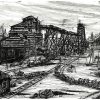
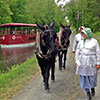






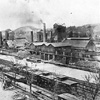

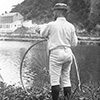







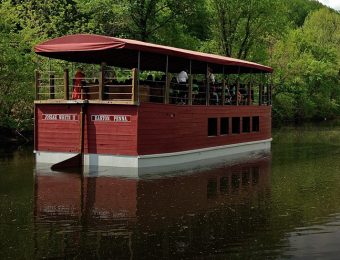


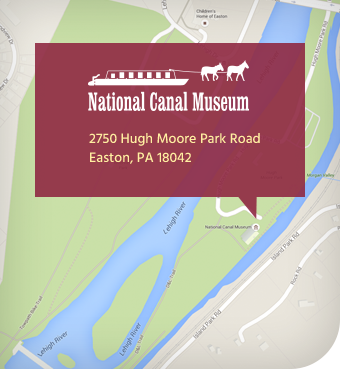
Join the Conversation!